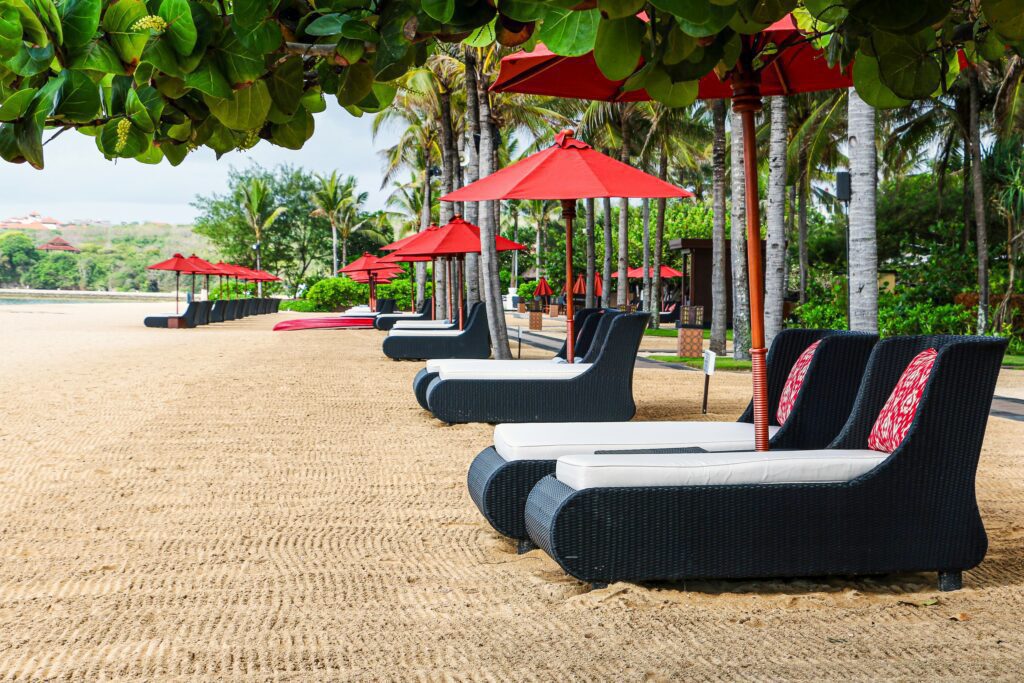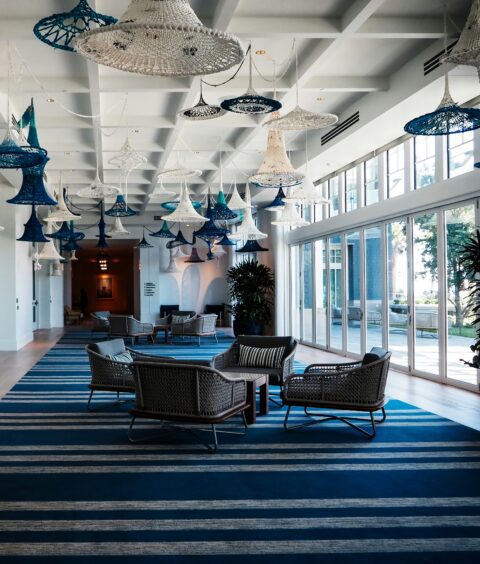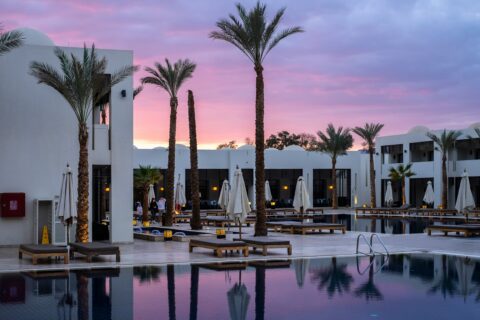Introduction to the concept of luxury in hospitality
Luxury in the world of hospitality has undergone a remarkable transformation over the years. From traditional opulence to modern elegance, hotels and resorts have evolved to provide guests with extraordinary experiences that go beyond mere accommodation. Whether you seek timeless grandeur or contemporary design, the evolution of hotel and resort experiences promises an unparalleled journey into luxury. So buckle up as we embark on a captivating exploration of how these havens of indulgence have adapted to meet the changing desires and expectations of discerning travelers like yourself. Get ready to be inspired by lavish amenities, personalized service, sustainable practices, technological innovations, and even the influence of unforeseen challenges such as the recent global pandemic. The future is here – let’s dive into this fascinating world where luxury knows no bounds!
The traditional hotel experience – grandeur and opulence
Imagine stepping into the lobby of a traditional luxury hotel. The first thing that catches your eye is the stunning chandelier hanging from the ceiling, sparkling with crystal prisms. The marble floors gleam under your feet, and you can’t help but feel a sense of grandeur and opulence.
As you make your way to your room, you pass by lavish furnishings and intricate artwork adorning the walls. The spacious suite welcomes you with plush bedding, elegant furniture, and a breathtaking view of the city skyline or pristine beach.
In these traditional hotels, attention to detail is paramount. From the personalized concierge service to the gourmet dining options, every aspect is designed to provide an unforgettable experience for guests. Fine dining restaurants offer exquisite cuisine prepared by world-renowned chefs using only the finest ingredients.
The spa facilities in these hotels are no exception – luxurious treatments using top-of-the-line products leave guests feeling pampered and rejuvenated. And let’s not forget about recreational activities like golf courses or private pools where guests can unwind in style.
While modern luxury hotels may have taken over with their sleek designs and contemporary aesthetics, there’s still something magical about experiencing old-world charm in a traditional hotel setting. It reminds us of an era when hospitality was synonymous with elegance and sophistication.
So next time you’re planning a getaway, why not indulge yourself in some good old-fashioned grandeur? You might just find yourself transported back in time while reveling in all the opulence that traditional luxury hotels have to offer.
The rise of modern luxury hotels – contemporary design and personalized experiences
Luxury hotels have come a long way from the traditional opulence and grandeur. The rise of modern luxury hotels has brought about a shift in design and experiences, catering to the evolving tastes and preferences of today’s discerning travelers.
Contemporary design is at the forefront of these modern luxury hotels. Gone are the heavy drapes, ornate chandeliers, and excessive gold accents. Instead, sleek lines, minimalist decor, and innovative architecture take center stage. These hotels exude elegance through simplicity, creating a sense of calmness and tranquility for guests.
Personalized experiences are another key element in modern luxury hotel stays. From personalized greetings upon arrival to tailored amenities based on guest preferences, these hotels go above and beyond to make every guest feel special. Whether it’s arranging unique excursions or curating customized dining experiences, they strive to create unforgettable moments that cater specifically to each individual.
Moreover, technology plays an integral role in enhancing personalized experiences in modern luxury hotels. Guests can control various aspects of their room using smart devices or enjoy seamless connectivity throughout the property. Virtual concierge services provide instant assistance while maintaining privacy and convenience.
The rise of social media has also influenced contemporary hotel design as spaces become more Instagrammable than ever before. Hotels now prioritize photogenic aesthetics with visually striking elements such as rooftop pools with stunning views or art installations that serve as captivating backdrops for guests’ posts.
In this era where sustainability is gaining prominence globally, eco-friendly practices have become crucial for modern luxury hotels too. Many properties implement energy-saving initiatives like solar panels or water conservation measures without compromising on comfort or style.
As we navigate through challenging times like the COVID-19 pandemic, health and safety considerations have further shaped the evolution of modern luxury hotel experiences. Enhanced cleaning protocols ensure guests feel secure during their stay while still enjoying all the luxurious amenities offered by these establishments
Overall,the rise of modern luxury hotels has transformed not just how we perceive luxury but also how we experience it. From contemporary design and personalized experiences
Evolving amenities and services in luxury resorts
Evolving Amenities and Services in Luxury Resorts
Luxury resorts have always been known for their exceptional amenities and services, but as the industry continues to evolve, so do these offerings. Today’s luxury resorts are going above and beyond to provide unique experiences that cater to the individual preferences of their guests.
Gone are the days where a simple spa or pool would suffice. Modern luxury resorts now boast an array of innovative amenities such as private plunge pools, rooftop bars with stunning panoramic views, state-of-the-art fitness centers with personal trainers, and even on-site culinary schools where guests can learn from renowned chefs.
In addition to these impressive facilities, luxury resorts are also focusing on providing personalized services that enhance each guest’s stay. From dedicated concierge teams who anticipate every need before it arises, to customized menus created based on dietary preferences or allergies – nothing is too much trouble for today’s luxury resort staff.
Another trend in evolving amenities is the integration of wellness programs into resort experiences. Many luxury resorts now offer activities such as yoga retreats, mindfulness workshops, and outdoor adventure excursions designed to promote physical and mental well-being.
Moreover, modern technology has played a significant role in enhancing guest experiences at luxury resorts. From mobile apps that allow guests to request services or book activities at the touch of a button to smart room systems that adjust lighting and temperature settings based on individual preferences – technology has become an integral part of creating seamless stays for discerning travelers.
As sustainability becomes increasingly important worldwide, many luxury resorts are also implementing eco-friendly practices into their operations. This includes initiatives like using renewable energy sources, reducing water consumption through advanced filtration systems, promoting locally sourced organic food options in their restaurants – all aimed at minimizing environmental impact while still delivering uncompromising quality.
The COVID-19 pandemic has undoubtedly impacted how luxury resorts operate. Health and safety measures have been implemented across the board including enhanced cleaning protocols and contactless check-in procedures to ensure guests feel safe and protected during their stay.
Looking ahead, it is
Sustainability and eco-friendly practices in modern luxury hotels
Sustainability and eco-friendly practices have become increasingly important in the modern luxury hotel industry. As travelers become more conscious of their environmental impact, hotels have begun implementing various initiatives to reduce their carbon footprint.
One major focus is on energy efficiency. Luxury hotels are investing in renewable energy sources such as solar panels and wind turbines to power their facilities. They are also utilizing smart technology to optimize energy consumption, from motion-sensor lighting systems to thermostat controls that adjust based on occupancy.
Water conservation is another crucial aspect of sustainable hotel practices. Many luxury hotels now use low-flow showerheads and toilets, as well as greywater recycling systems for irrigation purposes. Some properties even employ innovative technologies like rainwater harvesting or wastewater treatment plants.
To minimize waste, luxury hotels are adopting recycling programs and reducing single-use plastics throughout their operations. They provide guests with reusable water bottles instead of plastic ones, offer paperless check-in options, and prioritize composting organic waste whenever possible.
Furthermore, sustainable sourcing has gained traction in the hospitality industry. Modern luxury hotels strive to support local communities by partnering with nearby farmers markets or organic suppliers for fresh produce and ingredients used in their restaurants. This not only reduces transportation emissions but also promotes a healthier dining experience for guests.
In addition to these operational changes, many luxury hotels are incorporating green spaces within their premises. Rooftop gardens filled with native plants help improve air quality while providing a serene environment for guests to enjoy nature amidst urban settings.
By emphasizing sustainability and eco-friendly practices, modern luxury hotels demonstrate a commitment towards preserving the planet without compromising on comfort or style. These efforts align with the evolving expectations of discerning travelers who seek an authentic yet responsible travel experience.
The impact of technology on hotel experiences
Technology has undoubtedly revolutionized the way we experience hotels and resorts. With advancements in digital innovation, guests can now enjoy a seamless and personalized stay like never before.
One major impact of technology on hotel experiences is the convenience it offers. From online booking platforms to mobile check-ins, guests can skip long queues at the front desk and have a hassle-free arrival. Additionally, keyless entry systems allow guests to access their rooms using smartphones, eliminating the need for physical keys.
In-room amenities have also been enhanced by technology. Smart TVs with streaming services provide endless entertainment options, while voice-activated assistants enable guests to control lights, temperature, and even order room service with a simple command.
Moreover, technology has transformed guest communication. Hotel apps allow guests to request services or make inquiries at any time without having to pick up the phone or visit reception. Chatbots equipped with artificial intelligence are also becoming more common in providing instant assistance throughout a guest’s stay.
The use of virtual reality (VR) and augmented reality (AR) has further enriched hotel experiences. Guests can now take virtual tours of hotel facilities before making reservations or explore destination attractions through AR applications that overlay information onto real-world surroundings.
Technology has played a crucial role in enhancing safety measures within hotels during the pandemic. Contactless payments and sanitation robots are just some examples of how hotels have utilized technology to prioritize hygiene protocols and ensure guest well-being.
As technology continues to advance at an unprecedented pace, we can expect even more innovative solutions tailored to meet evolving customer demands in luxury hospitality. The integration of artificial intelligence, Internet of Things (IoT), and data analytics will undoubtedly shape future hotel experiences in ways that we cannot yet fully comprehend!
How the pandemic has influenced the evolution of hotel experiences
The COVID-19 pandemic has undoubtedly left a lasting impact on the hospitality industry, forcing hotels and resorts to rethink and adapt their experiences. One of the most significant changes has been the emphasis on health and safety measures. Hotels have implemented rigorous cleaning protocols, contactless check-ins, and social distancing guidelines to ensure the well-being of guests.
In addition to these practical changes, there has also been a shift in guest preferences. With travel restrictions in place, people have turned towards domestic tourism and staycations. As a result, hotels have had to create unique experiences within their properties to cater to this new demand. From offering exclusive access to private gardens or rooftop terraces for relaxation to organizing outdoor activities like hiking or cycling tours, hotels are finding innovative ways to keep guests entertained while adhering to safety guidelines.
Moreover, technology has played an essential role in enhancing hotel experiences during these challenging times. Many luxury properties now offer virtual concierge services through mobile apps or chatbots that allow guests to make requests without direct contact with staff members. In-room entertainment options have also evolved with the integration of streaming services like Netflix or Amazon Prime Video.
Another notable change is the increased focus on wellness offerings within hotel premises. With heightened concerns about personal health and self-care practices, many luxury hotels have expanded their spa facilities and introduced wellness programs such as yoga classes or meditation sessions for guests seeking relaxation and rejuvenation.
Furthermore, sustainability has become even more important in today’s world as travelers are increasingly conscious of environmental issues. Modern luxury hotels are incorporating eco-friendly practices into their operations by reducing plastic waste, implementing energy-saving initiatives like solar panels or LED lighting systems, and sourcing locally produced organic food for their restaurants.
Overallllyllylllhhlhllhhhhh,the pandemic has pushed tthehehe hospitality industry towardsssssinnovationnionon nndd adaptation.nn nnHotelsnnanddddresortstsstssstsssttssssttssts have embraced new technologies, prioritized health and
Future predictions for luxury hospitality industry
As the luxury hospitality industry continues to evolve, one can’t help but wonder what the future holds for hotels and resorts. Here are some predictions for what we can expect in the coming years.
1. Personalized experiences will be taken to new heights: With advancements in technology and data analytics, luxury hotels will have a deeper understanding of their guests’ preferences and needs. From customized room settings to tailored dining experiences, guests can anticipate a level of personalization like never before.
2. Sustainability will become even more important: As environmental concerns grow, luxury hotels will place greater emphasis on eco-friendly practices. From renewable energy sources to reducing waste and promoting local sourcing, sustainability initiatives will no longer be just an option but a necessity for high-end properties.
3. Integration of cutting-edge technology: Technology is already playing a significant role in enhancing hotel experiences, but it’s only going to become more prevalent in the future. Guests can look forward to seamless check-in processes using facial recognition or mobile apps that control everything from room temperature to personalized entertainment options.
4. Wellness-focused offerings will take center stage: The demand for wellness tourism has been on the rise, and luxury hotels are taking note. Expect spa services, fitness facilities with state-of-the-art equipment, meditation gardens, and healthy dining options as standard offerings in modern luxury resorts.
5. Immersive cultural experiences: Luxury travelers seek authentic connections with local culture during their stays. Hotels and resorts will offer immersive experiences such as cooking classes led by renowned chefs or curated tours that delve into the history and traditions of the destination.
6. Embracing diverse demographics: Luxury hospitality is no longer exclusively catered towards older affluent individuals; younger generations are becoming major players in this market too! Future luxury properties must adapt by incorporating elements that appeal to tech-savvy millennials who value unique experiences over material possessions.
7. The blending of work and leisure travel: As remote work becomes increasingly common post-pandemic, luxury hotels will cater to the needs of business travelers who wish







